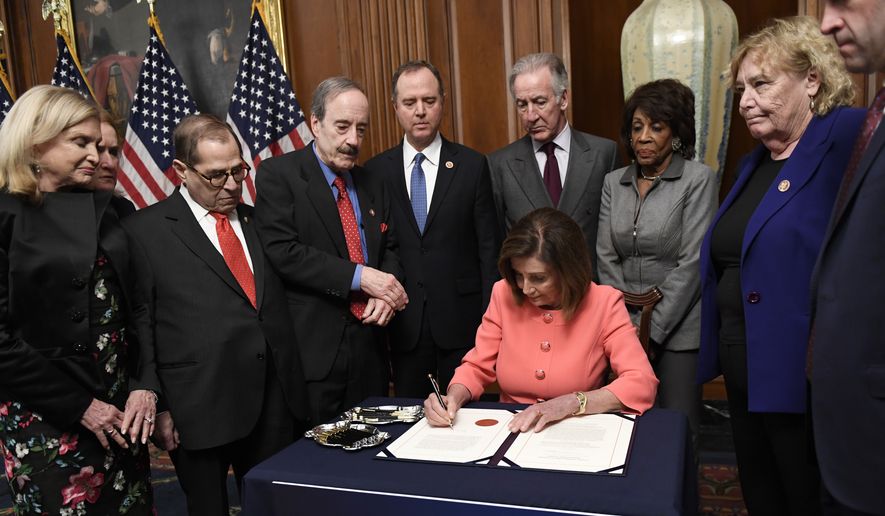House Democrats argued in their legal brief filed Saturday that President Trump must be convicted in the Senate’s upcoming impeachment trial and removed from office to safeguard the 2020 election.
“President Trump’s conduct is the Framers’ worst nightmare,” said the House impeachment managers, who will act as prosecutors during the trial next week.
House Democrats charge Mr. Trump with violating the office of the presidency and trying to obtain help from a foreign country to benefit himself politically.
In the roughly 60-page brief, the House detailed its inquiry into the president’s July 25 phone call with the Ukrainian president where Mr. Trump asked for a probe into a political rival, former Vice President Joseph R. Biden.
The lawmakers argue Mr. Trump defied subpoenas during their inquiry as he did in “past efforts to obstruct the Special Counsel’s investigation into Russian interference in the 2016 election.”
“President Trump abused the power of his office to solicit foreign interference in our elections for his own personal political gain, thereby jeopardizing our national security, the integrity of our elections, and our democracy,” the impeachment managers said in a joint statement.
House Democrats also argued that Mr. Trump’s request for an investigation into Ukraine meddling in the 2016 election would benefit him by adding “legitimacy” to his presidency.
They argued that an investigation of Ukraine meddling would obscure the fact that Russia interfered in the 2016 election.
“Ukraine’s announcement of that investigation would bolster the perceived legitimacy of his Presidency and, therefore, his political standing going into the 2020 race,” said the document.
The filing comes after House Speaker Nancy Pelosi held on to the articles of impeachment for about a month after her chamber voted down party line to impeach Mr. Trump for obstruction of Congress and abuse of power.
The brief also included new evidence gathered during that impasse, as it referenced the Government Accountability Office’s opinion released earlier in the week, saying the Trump administration violated the law by withholding the aid from Ukraine.
The House Democrats also cite Lev Parnas, an associate of Rudy Giuliani, who worked as Mr. Trump’s personal attorney, arguing Mr. Giuliani sent a letter to the Ukrainian president in May of 2019 requesting a meeting. He reportedly claimed he was reaching out under the president’s consent.
The impeachment inquiry began in September after a whistleblower, who is said to be a CIA official assigned to the White House, accused the president of abusing his power for personal gain on the call, including withholding $391 million of U.S. military aid from Ukraine as leverage.
The whistleblower also is believed to have ties to the Democratic Party and the elder Mr. Biden, and the whistleblower is known to have met with Mr. Schiff’s staff for guidance before making the complaint.
A rough transcript of the call the White House released in late September did not show the president present a quid pro quo deal for the investigations, but Democrats said the threat was understood and part of an ongoing pressure campaign of “shadow” foreign policy conducted by Mr. Trump’s private lawyer, former New York Mayor Rudolph W. Giuliani.
New evidence the House Democrats obtained since passing the two articles of impeachment in a party-line vote Dec. 18 detail Mr. Giuliani’s activities in Ukraine but does not significantly change what was already known.
The articles rely heavily on testimony from Gordon Sondland, the ambassador to the European Union, who said he offered a prized White House visit for the newly-elected Mr. Zelensky in exchange for his announcement of the investigations. But Mr. Sondland said he “presumed” that was what Mr. Trump wanted.
In his only conversation with the president about it, Mr. Trump told him that there was “no quid pro quo,” he testified.
None of the witnesses in the impeachment inquiry linked the holdup of military assistance to the investigations or provided a reason for the holdup. The aid was delayed for about two months, before the money started to flow to Ukraine on Sept. 11, two days after the Inspector General of the Intelligence Community informed Congress of the whistleblower complaint.
Mr. Trump has acknowledged that he wanted an investigation into alleged corruption involving the Bidens and Ukraine interference in the 2016 election.
Interest increased in Mr. Biden’s actions in Ukraine after he recently boasted of forcing Ukraine to fire the country’s chief prosecutor in spring 2016. He said he threatened to block a $1 billion U.S. loan guarantee. The prosecutor was widely viewed as not doing enough to combat corruption. But the prosecutor, Viktor Shokin, also had looked into corruption allegations against Burisma and Mykola Zlochevsky, the Ukraine oligarch running the company.
Mr. Trump also wanted Ukraine to look into a missing Democratic National Committee server that was hacked by Russia during the 2016 presidential campaigns. An American cybersecurity company called CrowdStrike examined the server to probe the hack but did not have physical control over it. The review was done through imaging. The server disappeared before it got to the FBI.
Mr. Trump subscribes to an unsubstantiated theory that the server ended up in Ukraine.
• S.A. Miller can be reached at smiller@washingtontimes.com.
• Alex Swoyer can be reached at aswoyer@washingtontimes.com.




Please read our comment policy before commenting.